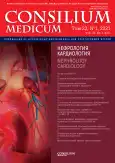Sodium-glucose co-transporter-2 inhibitors in patients with heart failure. What's new? What are the prospects?
- Authors: Erlikh A.D.1,2, Riabova D.V.1
-
Affiliations:
- Pirogov Russian National Research Medical University
- Bauman City Clinical Hospital №29
- Issue: Vol 23, No 1 (2021)
- Pages: 48-51
- Section: Articles
- URL: https://bakhtiniada.ru/2075-1753/article/view/95412
- DOI: https://doi.org/10.26442/20751753.2021.1.200681
- ID: 95412
Cite item
Full Text
Abstract
Full Text
##article.viewOnOriginalSite##About the authors
Alexey D. Erlikh
Pirogov Russian National Research Medical University; Bauman City Clinical Hospital №29
Email: alexeyerlikh@gmail.com
Москва, Россия
Dar'ia V. Riabova
Pirogov Russian National Research Medical Universityврач-кардиолог Москва, Россия
References
- Wiviott SD, Raz I, Bonaca MP, et al. Dapagliflozin and cardiovascular outcomes in type 2 diabetes. N Engl J Med 2019; 380: 347-57.
- Zinman B, Wanner C, Lachin JM, et al. Empagliflozin, cardiovascular outcomes, and mortality in type 2 diabetes. N Engl J Med 2015; 373: 2117-28.
- Neal B, Perkovic V, Mahaffey KW, et al. Canagliflozin and cardiovascular and renal events in type 2 diabetes. N Engl J Med 2017; 377: 644-57B. doi: 10.1056/NEJMoa1611925
- Tavazzi L, Maggioni AP, Marchioli R, et al. Effect of rosuvastatin in patients with chronic heart failure (the GISSI-HF trial): a randomised, double-blind, placebo-controlled trial. Lancet 2008; 372: 1231-39.
- Kjekshus J, Apetrei E, Barrios V, et al. Rosuvastatin in older patients with systolic heart failure. N Engl J Med 2007; 357: 2248-61.
- Lam CSP, Chandramouli C, Ahooja V, Verma S. SGLT-2 Inhibitors in Heart Failure: Current Management, Unmet Needs, and Therapeutic Prospects. J Am Heart Ass 2019; 8 (20): 1-12.
- Griffin M, Rao VS, Miranda JI, et al. Empagliflozin in Heart Failure. Circulation 2020; 142: 1028-39.
- McMurray JJV, Solomon SD, Inzucchi SE, et al.; DAPA-HF Trial Committees and Investigators. Dapagliflozin in Patients with Heart Failure and Reduced Ejection Fraction. Engl J Med 2019; 381: 1995-2008.
- Packer M, Anker SD, Butler L, et al.; EMPEROR-Reduced Trial Investigators. Cardiovascular and Renal Outcomes with Empagliflozin in Heart Failure. N Engl J Med 2020; 383: 1413-24.
- Heerspink HJL, Stefansson BV, Rotter RC, et al.; DAPA-CKD Trial Committees and Investigators. Dapagliflozin in Patients with Chronic Kidney Disease. N Engl J Med 2020; 383: 1436-46.
- Bhatt DL, Szarek M, Pitt B, et al; SCORED investigators. Sotagliflozin in Patients with Diabetes and Chronic Kidney Disease. N Engl J Med 2021; 384: 129-39.
- Perkovic V, Jardine MJ, Neal B, et al.; CREDENCE Trial Investigators. Canagliflozin and Renal Outcomes in Type 2 Diabetes and Nephropathy. N Engl J Med 2019; 380: 2295-306.
- Bhatt DL, Szarek M, Steg PG, et al.; SOLOIST-WHF Trial Investigators. Sotagliflozin in Patients with Diabetes and Recent Worsening Heart Failure. N Engl J Med 2021; 384: 117-28.
- Cannon CP, Pratley R, Dagogo-Jack S, et al.; VERITIS-CV investigators. Cardiovascular outcomes with ertugliflozin in type 2 diabetes. N Engl J Med 2020; 383: 1425-35.
- Damman K, Beusekamp JC, Boorsma EM, et al. Randomized, double-blind, placebo-controlled, multicentre pilot study on the effects of empagliflozin on clinical outcomes in patients with acute decompensated heart failure (EMPA-RESPONSE-AHF). Eur Heart J 2020; 22 (4): 713-22.
- National Institutes of Health. Efficacy and Safety of Dapagliflozin in Acute Heart Failure (DICTATE-AHF). Identifier NCT04298229. Available at: https://clinicaltrials.gov/ct2/show/record/NCT04298229
- National Institutes of Health. Dapagliflozin Evaluation to Improve the LIVEs of Patients With PReserved Ejection Fraction Heart Failure. (DELIVER). NCT03619213. Available at: https://clinicaltrials.gov/ct2/show/NCT03619213?term=dapagliflozin&cond=Heart+Failure+with+Pre-served+Ejection+Fraction&rank=1#wrapper. Accessed: 13 August 2018.
- Williams DM, Evans M. Dapagliflozin for heart failure with preserved ejection fraction: will the DELIVER study deliver? Diabetes Ther 2020; 11: 2207-19.
- Connely KA, Zhang Y, Visram A, et al. Empagliflozin Improves Diastolic Function in a Nondiabetic Rodent Model of Heart Failure With Preserved Ejection Fraction. JACC: Basic to Translational Science 2019; 4 (1): 27-37.
Supplementary files






